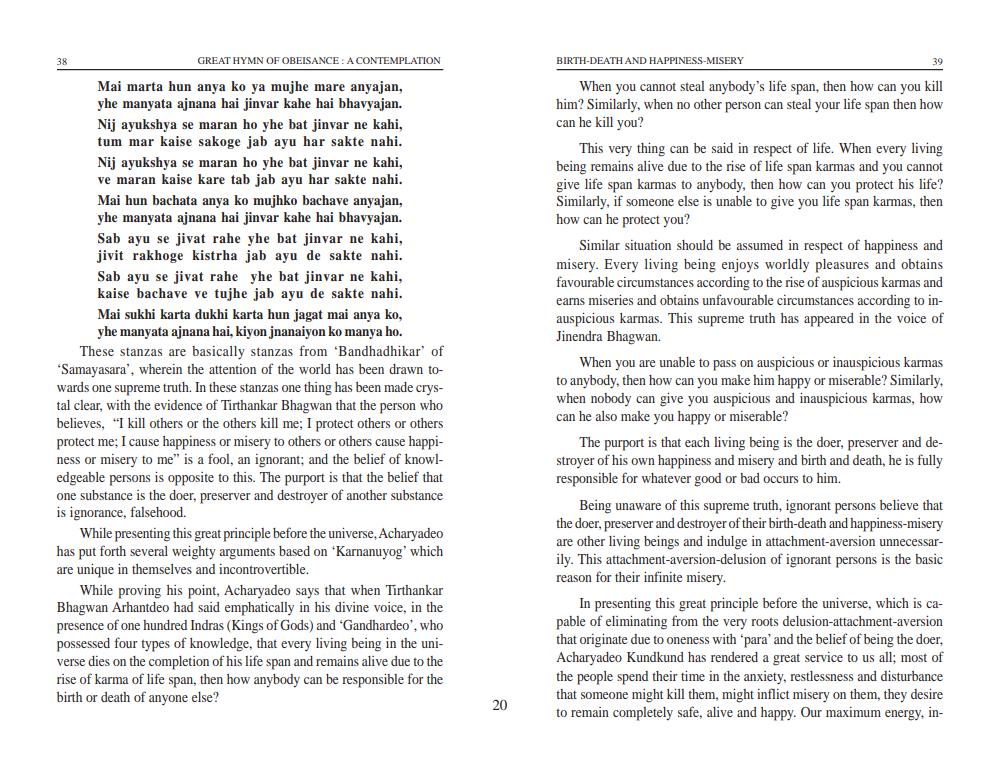________________
GREAT HYMN OF OBEISANCE: A CONTEMPLATION
BIRTH-DEATH AND HAPPINESS-MISERY
Mai marta hun anya ko ya mujhe mare anyajan, yhe manyata ajnana hai jinvar kahe hai bhavyajan. Nij ayukshya se maran ho yhe bat jinvar ne kahi, tum mar kaise sakoge jab ayu har sakte nahi. Nij ayukshya se maran ho yhe bat jinvar ne kahi, ve maran kaise kare tab jab ayu har sakte nahi. Mai hun bachata anya ko mujhko bachave anyajan, yhe manyata ajnana hai jinvar kahe hai bhavyajan. Sab ayu se jivat rahe yhe bat jinvar ne kahi, jivit rakhoge kistrha jab ayu de sakte nahi. Sab ayu se jivat rahe yhe bat jinvar ne kahi, kaise bachave ve tujhe jab ayu de sakte nahi. Mai sukhi karta dukhi karta hun jagat mai anya ko,
yhe manyata ajnana hai, kiyon jnanaiyon ko manya ho. These stanzas are basically stanzas from 'Bandhadhikar of "Samayasara', wherein the attention of the world has been drawn towards one supreme truth. In these stanzas one thing has been made crystal clear, with the evidence of Tirthankar Bhagwan that the person who believes, "I kill others or the others kill me; I protect others or others protect me: I cause happiness or misery to others or others cause happiness or misery to me is a fool, an ignorant, and the belief of knowledgeable persons is opposite to this. The purport is that the belief that one substance is the doer, preserver and destroyer of another substance is ignorance, falsehood.
While presenting this great principle before the universe, Acharyadeo has put forth several weighty arguments based on Karnanuyog' which are unique in themselves and incontrovertible.
While proving his point, Acharyadeo says that when Tirthankar Bhagwan Arhantdeo had said emphatically in his divine voice, in the presence of one hundred Indras (Kings of Gods) and "Gandhardeo', who possessed four types of knowledge, that every living being in the universe dies on the completion of his life span and remains alive due to the rise of karma of life span, then how anybody can be responsible for the birth or death of anyone else?
When you cannot steal anybody's life span, then how can you kill him? Similarly, when no other person can steal your life span then how can he kill you?
This very thing can be said in respect of life. When every living being remains alive due to the rise of life span karmas and you cannot give life span karmas to anybody, then how can you protect his life? Similarly, if someone else is unable to give you life span karmas, then how can he protect you?
Similar situation should be assumed in respect of happiness and misery. Every living being enjoys worldly pleasures and obtains favourable circumstances according to the rise of auspicious karmas and earns miseries and obtains unfavourable circumstances according to inauspicious karmas. This supreme truth has appeared in the voice of Jinendra Bhagwan
When you are unable to pass on auspicious or inauspicious karmas to anybody, then how can you make him happy or miserable? Similarly, when nobody can give you auspicious and inauspicious karmas, how can he also make you happy or miserable?
The purport is that each living being is the doer, preserver and destroyer of his own happiness and misery and birth and death, he is fully responsible for whatever good or bad occurs to him.
Being unaware of this supreme truth, ignorant persons believe that the doer, preserver and destroyer of their birth-death and happiness-misery are other living beings and indulge in attachment-aversion unnecessarily. This attachment-aversion-delusion of ignorant persons is the basic reason for their infinite misery.
In presenting this great principle before the universe, which is capable of eliminating from the very roots delusion-attachment-aversion that originate due to oneness with 'para' and the belief of being the doer, Acharyadeo Kundkund has rendered a great service to us all; most of the people spend their time in the anxiety, restlessness and disturbance that someone might kill them, might inflict misery on them, they desire to remain completely safe, alive and happy. Our maximum energy, in
20




